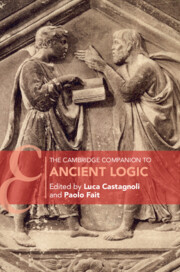Book contents
- The Cambridge Companion to Ancient Logic
- Other Volumes in the Series of Cambridge Companions
- The Cambridge Companion to Ancient Logic
- Copyright page
- Contents
- Contributors
- Introduction
- I The Development of Logic in Antiquity
- 1 The Prehistory of Logic
- 2 Aristotle and Theophrastus
- 3 Megarians and Stoics
- 4 Late Antiquity
- II Key Themes
- III The Legacy of Ancient Logic
- Bibliography
- Abbreviations
- Index of Passages
- General Index
- Other Volumes in the Series of Cambridge Companions
4 - Late Antiquity
from I - The Development of Logic in Antiquity
Published online by Cambridge University Press: 29 April 2023
- The Cambridge Companion to Ancient Logic
- Other Volumes in the Series of Cambridge Companions
- The Cambridge Companion to Ancient Logic
- Copyright page
- Contents
- Contributors
- Introduction
- I The Development of Logic in Antiquity
- 1 The Prehistory of Logic
- 2 Aristotle and Theophrastus
- 3 Megarians and Stoics
- 4 Late Antiquity
- II Key Themes
- III The Legacy of Ancient Logic
- Bibliography
- Abbreviations
- Index of Passages
- General Index
- Other Volumes in the Series of Cambridge Companions
Summary
Logic didn’t develop much in the period from the early Stoics to Boethius. Certainly, there was nothing to match the ground-breaking discoveries of Aristotle and Chrysippus. Aristotle found for us the figures of the syllogism, and in the course of proving those forms to be correct, uncovered and exploited numerous logical laws. He even managed to make steps in the right direction with his modal syllogistic. The early Stoics found for us the indemonstrables, the method of analysis, and the themata. There are few, if any, comparable discoveries in the later period. The closest anyone came was Galen with his relational syllogisms, a ‘third class’ of syllogisms that Galen argued was a necessary supplement to Aristotelian and Stoic syllogistic. Moreover, it is also hard to deny that there were some steps backwards taken by some of the later logicians, by which I mean there were some serious misunderstandings of the logical theory of their predecessors.
- Type
- Chapter
- Information
- The Cambridge Companion to Ancient Logic , pp. 82 - 106Publisher: Cambridge University PressPrint publication year: 2023



